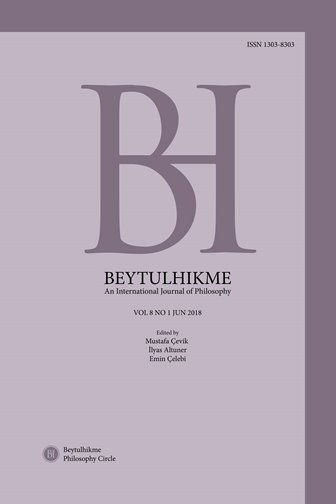Author :
Abstract
Bu makale, felsefi açısından yeteri kadar üzerinde durulmamış bir konu olan gülme konusunu ve bununla ilişkili olarak komik olanın içeriği ve bağlamını incelemeyi amaçlamaktadır. Gülmeye ilişkin Platon, Aristoteles, Bergson, Hegel gibi büyük filozofların görüşleri incelenerek tarih boyunca daha aşağı toplumsal tabakalara ait görünen komedinin, siyaset felsefesi açısından toplumsal bir muhalefet formu olarak görülmesinin mümkün olup olmadığı incelenecektir. Bergson’un görüşleri bağlamında gülmenin, toplumsal ve birleştirici olan boyutuna dikkat çekilerek, birlikte gülmenin ancak toplumsal ve tarihsel bir ortaklaşma zemininde mümkün olduğu vurgulanacaktır. Gülmenin birleştirici ve dönüştürücü bir güce sahip olmasının ise tarihsel ve toplumsal bağlamının doğru değerlendirilmesi ile mümkün hale geleceği ifade edilecektir.
Keywords
Abstract
This article aims to study the issue of laughter, which has yet not been sufficiently discussed in terms of philosophy and to analyze the content and context of the funny thing. Views of great philosophers such as Plato, Aristoteles, Bergson and Hegel, about laughter, will be studied to find out whether comedy, which seems to have belonged to the lower social class throughout the history, can be considered as a form of social opposition regarding political philosophy. The social and connecting dimension of laughter will be discussed within the framework of Bergson’s views and it will be noted that laughing together can only be possible on a social and historical ground of consensus. It will be stated that laughter can have a connecting and transforming power only if the historical and social contexts are properly evaluated.
Keywords
- Aristophanes (2006). Eşekarıları, Kadınlar Savaşı ve Diğer Oyunlar. (Çev. S. Eyüboğ- lu & A. Erhat). İstanbul: Türkiye İş Bankası Kültür Yayınları.
- Aristoteles (1999). Eudemos’a Etik. (Çev. S. Babür). Ankara: Dost Kitabevi.
- Aristoteles (2001). Retorik. (Çev. M. H. Doğan). İstanbul: Yapı Kredi Yayınları.
- Aristoteles (2012). Nikomakhos’a Etik. (Çev. S. Babür). Ankara: BilgeSu Yayıncılık.
- Aristoteles (2016). Poetika. (Çev. S. Rıfat). İstanbul: Can Yayınları.
- Bahtin, M. (2014). Karnavaldan Romana. (Çev. C. Soydemir). İstanbul: Ayrıntı Yayınları.
- Bahtin, M. (2016). Söylem Türleri ve Başka Yazılar. (Çev. O. N. Çiftçi). İstanbul: Metis Yayınları.
- Bergson, H. (2011). Gülme. (Çev. D. Çetinkasap). İstanbul: Türkiye İş Bankası Kültür Yayınları.
- Hegel, G. W. F. (2004). Tinin Görüngübilimi. (Çev. A. Yardımlı). İstanbul: İdea Yayınevi.
- Kierkegaard, S. (2005). Kahkaha Benden Yana. (Çev. N. Çatlı). İstanbul: Ayrıntı
- Kundela, M. (2016). Gülüşün ve Unutuşun Kitabı. (Çev. E. Bener). İstanbul: Can
- Morreall, J. (1997). Gülmeyi Ciddiye Almak. (Çev. K. Aysevener & Ş. Soyer). İstan- bul: İris Yayıncılık.
- Phillips, A. (2016). Öpüşme, Gıdıklanma ve Sıkılma Üzerine. (Çev. F. Taşkent). İs- tanbul: Ayrıntı Yayınları.
- Platon (2001). Devlet. (Çev. S. Eyüboğlu & M. A. Cimcoz). İstanbul: Türkiye İş Bankası Kültür Yayınları.
- Platon (2012). Yasalar. (Çev. C. Şentuna & S. Babür). Ankara: Dost Kitabevi.
- Rabelais, F. (2016). Gargantua. (Çev. S. Eyüboğlu, A. Erhat & V. Günyol). İstan- bul: Türkiye İş Bankası Kültür Yayınları.
- Zizek, S. (2006). Kırılgan Temas. (Çev. T. Birkan). İstanbul: Metis Yayınları.
- Zupancic, A. (2011) Komedi: Sonsuzun Fiziği. (Çev. T. Birkan). İstanbul: Metis Öz: Bu makale, felsefi açısından yeteri kadar üzerinde durulmamış bir konu olan gülme konusunu ve bununla ilişkili olarak komik olanın içeriği ve bağlamını incelemeyi amaçlamaktadır. Gülmeye ilişkin Platon, Aristoteles, Bergson, Hegel gibi büyük filozofların görüşleri incelenerek tarih boyunca daha aşağı toplumsal tabakalara ait görünen komedinin, siyaset felsefesi açısından toplumsal bir muhalefet formu olarak görülmesinin mümkün olup olmadığı incelenecektir. Bergson’un görüşleri bağlamında gülmenin, toplumsal ve birleştirici olan boyutuna dikkat çekilerek, birlikte gülmenin ancak toplumsal ve tarihsel bir ortaklaşma zemininde mümkün olduğu vurgulanacaktır. Gülmenin birleştirici ve dönüştürücü bir güce sahip olmasının ise tarihsel ve toplumsal bağlamının doğru değerlendirilmesi ile mümkün hale geleceği ifade edilecektir. Anahtar Kelimeler: Gülme, komedi, komik, muhalefet, gülmenin toplumsal bağlamı.





